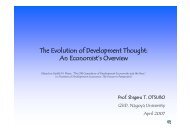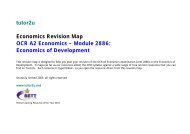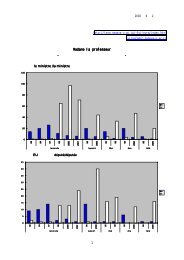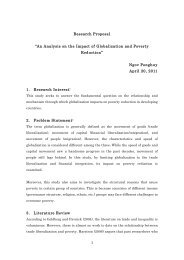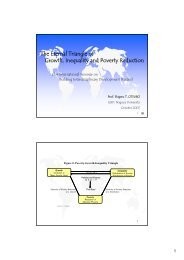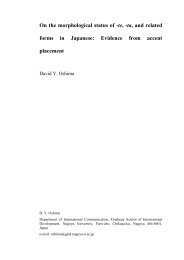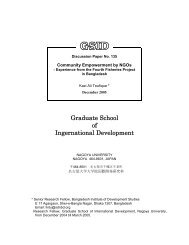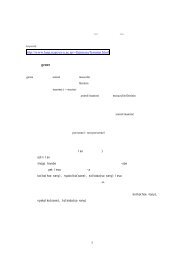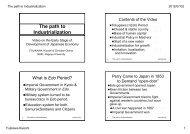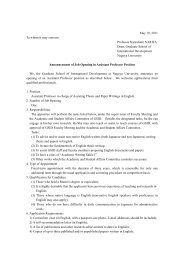Report
Report
Report
Create successful ePaper yourself
Turn your PDF publications into a flip-book with our unique Google optimized e-Paper software.
CONSTRUCTION AND RELATED ENGINEERING SERVICES 115<br />
ever, a market is emerging in an area nearby the Male<br />
capital island. The World Bank suggests that the government<br />
needs to become a facilitator/regulator instead of<br />
land provider. The absence of a vibrant private land<br />
market aggravates the access-to-finance issue, especially<br />
since banks still focus on collateral based lending rather<br />
than cash flows. In this regard, the World Bank suggests<br />
that the government should promote the establishment<br />
of modern movable assets registry in order to encourage<br />
using such assets as collateral.<br />
One of the major challenges for the government is<br />
how to attract investments within the structure of an<br />
increasingly competitive market economy while<br />
protecting the vulnerable groups. This is endorsed by<br />
the government’s Vision 2020. Land and housing<br />
markets are an integral component of a dynamic market<br />
economy, which was recognised in the sixth National<br />
Development Plan. This will require, as the World Bank<br />
suggests, a paradigm shift in the role of the government<br />
from being a direct provider to being a facilitator and<br />
a regulator by allowing the development of housing<br />
markets in the private sector and local communities<br />
(The World Bank 2006). Presently, no comprehensive<br />
regulatory framework for housing and urban management<br />
exists in the Maldives.<br />
The Maldives is an import dependent country and<br />
it requires modern construction services to support its<br />
thriving tourism sector and other needs of the country.<br />
WTO commitments in this sector help the country in<br />
better articulate its import requirements. This will also<br />
bring in transparency and predictability in the system<br />
from which both the Maldives as an importing country<br />
and others as exporting countries would benefit. Also<br />
since its trade regime seems to be relatively liberal, there<br />
is no reason why the Maldives should not undertake<br />
wider and deeper commitments in this sector given its<br />
very strong import interest. At least under the SAFTA<br />
it must do so. This will help the country immensely by<br />
accessing cheaper services from the region and may lead<br />
to enhancement of the skill levels of the labour force.<br />
Bhutan<br />
Although as part of its accession negotiations Bhutan<br />
has already submitted its offer in services, the same<br />
has not been made available for the use of public.<br />
However, there is evidence suggesting that Bhutan has<br />
made relatively liberal commitments in services. It<br />
should be a repeat of Nepal’s story. Thus it is expected<br />
that Bhutan might have undertaken commitments in<br />
the construction and related engineering services sector.<br />
According to the restricted document available with<br />
WTO members, Bhutan has offered to undertake<br />
commitments for warehouses and industrial buildings<br />
(CPC 51230) under the sub-sector – general construction<br />
work for buildings. It has also proposed to make<br />
commitments for highways (except elevated highways,<br />
streets, roads, railways and airfield runways (CPC<br />
51310); bridges, elevated highways, tunnels and subways<br />
(CPC 51320); long distance pipelines, communication<br />
and power lines (cables) (CPC 51340); local<br />
pipelines and cables, ancillary works (CPC 51350); and<br />
construction, mining and manufacturing (CPC 51360).<br />
Thus in two sub sectors of the construction sector<br />
Bhutan has taken broad commitments and coverage<br />
wise it is by no means less than that of Pakistan. Further,<br />
in the Market Access column, under Modes 1 and 2<br />
there are no restrictions inscribed. Under Mode 3 the<br />
limitations include services to be provided through<br />
incorporation where the foreign investor equity shall<br />
be limited to a maximum of 49% and jobs below $11<br />
million to be reserved for the domestic industry. Mode<br />
4 remains unbound and refers to the horizontal section.<br />
In the National Treatment column, Modes 1, 2, and 3<br />
have got no restrictions and the status of Mode 4 is<br />
same as in the Market Access column.<br />
In its horizontal section, Bhutan has inscribed<br />
certain limitations in the Market Access column under<br />
Mode 3 that in order to establish a new commercial<br />
presence in Bhutan the minimum size of foreign<br />
investment shall be $0.5 million, foreign investor’s<br />
equity holding limited to 70%, and the business must<br />
also be incorporated in Bhutan. The investment shall<br />
be governed by sector specific policies and procedures<br />
as established in the sectors included in this schedule.<br />
Also Mode 3 is unbound for measures regulating<br />
publicly funded services including with respect to<br />
national treatment. In the National Treatment column<br />
there are some limitations, which include foreign<br />
investors required to foster transfer of technology,<br />
introduction of management skills and provide training<br />
and employ Bhutanese nationals at all levels in the<br />
enterprise. Moreover, the shares held by foreign<br />
nationals and foreign juridical persons in locally<br />
incorporated companies are not transferable without<br />
prior permission by the Government of Bhutan.<br />
The share of construction sector in the Bhutan’s<br />
GDP has increased from 7.9% in 1980 to 12.1% in<br />
2001 (UNESCAP 2003:191). However, this has been<br />
largely attributable to the construction of hydropower<br />
projects. In Bhutan the regulatory body is the construction<br />
development board (CDB) – an interagency of the<br />
Royal Government of Bhutan – that regulates the




